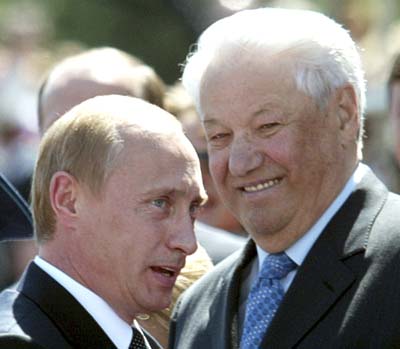Ex-Russian President Yeltsin dies at 76
(Agencies)Updated: 2007-04-24 07:28
| |||
Mikhail Gorbachev, the last Soviet president, whom Yeltsin effectively forced from office, paid tribute to his achievements, and noted his shortcomings. "I express the very deepest condolences to the family of the deceased, on whose shoulders rest major events for the good of the country, and serious mistakes," Gorbachev said.
Yeltsin had for years been dogged by heart problems that required multiple heart bypass surgery while he was still in office. His deteriorating health ultimately forced him to anoint Vladimir Putin as his successor and step aside seven years ago.
Yeltsin ruled Russia from 1991 to the last day of 1999, when he handed over power to Putin. He was the first Russian leader to step down voluntarily.
Born into a poor peasant family in an industrial region in the Ural mountains, Yeltsin lived with his family in one room of a wooden hut.
He studied civil engineering and rose to become a successful construction manager before switching to work for the local Communist party.
Gorbachev, looking for thrusting managers to re-invigorate Soviet rule, summoned him to Moscow to become the capital's party chief. He was sacked for his maverick style but in 1989 he was elected to the new Soviet Congress of People's Deputies and in June 1991 he was elected president of Russia - still within the Soviet Union - in a landslide.
Two months later, he faced down tanks in the Moscow streets, and six months after that, he signed a treaty with the leaders of Ukraine and Belarus disintegrating the Soviet Union altogether. Yeltsin, triumphant, became president of a sovereign Russia.
World leaders responded quickly yesterday to Yeltsin's death, calling him a personal friend and praising him as a courageous fighter during the Soviet Union's dramatic change that marked the end of the Cold War.
The European Union and the NATO alliance hailed Yeltsin as a healer of the Cold War divide.
Chronology of Yeltsin's career
Boris Nikolayevich Yeltsin was born on February 1, 1931.
After graduating from Urals Polytechnical Institute in 1955, he worked as a construction worker in Sverdlovsk (now Yekaterinburg).
In 1961, he joined the Communist Party of the former Soviet Union (CPSU).
In 1981, he was elected a member of the central committee of the CPSU.
In 1985, he was appointed first secretary of the Moscow City Committee of the CPSU and in 1986, an alternate member of the party's top decision making body the politburo of the central committee.
July 1989, he was elected a co-chairman of the interregional parliamentary group.
May 1990, he became president of the Supreme Soviet of the Russian Federation. July 12, 1990, at the 28th Congress of the CPSU, he announced his withdrawal from the party.
June 12, 1991, he was elected president of the Russian Federation. June 1996, he won a second term as president.
August 18, 1991, hard-liners attempted a coup against Gorbachev. Yeltsin famously defied the coup while standing on a tank.
December 8, 1991: Yeltsin, and leaders of Belarus and Ukraine, declared Soviet Union extinct.
October 3, 1993, Yeltsin declared state of emergency in Moscow after supporters of hard-line parliament overwhelm riot police, seized government buildings.
February 18, 1999, Parliamentary panel finalized impeachment charges against Yeltsin.
May 12, 1999, One day before impeachment hearings in parliament, Yeltsin fired Yevgeny Primakov, and named Interior Minister Sergei Stepashin as a replacement.
August 9, 1999, Yeltsin fired Stepashin and named Vladimir Putin, the head of the Federal Security Service, the acting prime minister. The president also said Putin was his preferred successor.
December 31, 1999, he resigned as president and transferred power to Putin.
The former Russian president had been suffering from heart diseases. In November 1996, he underwent a successful quintuple heart bypass operation in the Central Clinical Hospital.
|
||
|
||
|
|

